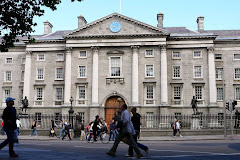
-
hello@abroadcube.com
Mail us
-
Call For Help:
98779 83783
-
Whatsapp Us
70090 34921


Please note
Services
Study Abroad ServicesIrland has 2 intakes in a year
September
It commences from 3rd week of September in most of the Universities in Ireland. This is the significant intake for Universities across Ireland. Most of the Universities have high-demand programs available in this intake.
Jan - Feb
It starts between 3rd week of Jan and Feb in many universities. Most of the Universities have only Post-graduation programs in this intake. It is the best option if you missed the Fall intake, however program availability is lower than Fall.
ExamPrep
English & Aptitude ExamsEnglish Exam is required in all Universities
Expenses
Total ExpenditureStudying in Ireland is comparatively competitive, as Tuition Fees for a Master's degree start at just EUR 9000 yearly. Universities have higher tuition fees than Colleges and Institutes of Technology due to enhanced teaching standards and world rankings. The universities are usually state-funded, and colleges are privately owned. The admission process is easy and hard depending on the institution's World Ranking.
| Level | Avg Tuition | Duration |
|---|---|---|
| Bachelors | €6,000 - €29,000 / year | 3-4 years |
| Masters | €12,000 - 36,000 / year | 1-2 years |
| MBA | $13,500 - $36,000 / year | 1-2 years |
| Doctorate / PhD | $4,000 - $20,000 / year | 3-4 years |
According to the Department of Justice, you must have a minimum of €10,000 for living expenses and a ready-to-use format such as a bank balance, fixed deposits, or education loan. However, it is recommended that you show at least €12,000 for enhanced Visa approval chances. The estimated monthly expenses for an international student range between €900 and €2000, depending on various factors and living standards.
Here is the estimated cost of Study Bachelors in Ireland. Get Started and Save more
Here is the estimated cost of Study Masters in Ireland. Get Started and Save more
Here is the estimated cost of Study MBA in Ireland. Get Started and Save more

As per Ireland Study Visa (Stamp-2) laws, you can work up to 20 hours per week and full-time up to 40 hours per week during holiday periods. The holiday breaks are fixed for all students regardless of their University and Course, that is from 15 December to 15 Jan and 1 June to 30 September. The national minimum wage in Ireland is €12.70 per hour.
It refers to jobs given by the University to students on campus. Typical jobs are campus tour guides, lab assistants, research assistants, office admins, etc. Most institutions pay equal to the minimum wage for hours worked. There is high competition for these jobs due to limited seats. The number of hours worked on campus will be deducted from the permissible limit.
Some courses in Ireland require practical training in the real world along with academic learning. It is part of coursework; a student is expected to work full-time, similar to a real job. The usual length of the Internship is between 6 weeks and 6 months. Many students get full-time jobs with the same employer after their studies, so it is highly recommended to work with full enthusiasm.

| Profession | Average Salary |
|---|---|
| Chief Executive Officer | €68K - €163K |
| Finance Director | €99K - €147K |
| Sales Director | €23K - €149K |
| Director of Operations | €91K - €120K |
| Technical Architect | €54K - €90K |
| Software Development Manager | €101K - €122K |
| IT Senior Project Manager | €85K - €98K |
| Chief Financial Officer | €120K - €400K |
| Lawyers | €76K - €85K |


| Qualification | Duration | Level |
|---|---|---|
| Bachelor's Degree | 3 years | Level 7 |
| Honours Bachelor's Degree | 4 years | Level 8 |
| Graduate Diploma | 1 years | Level 8 |
| Master's Degree | 1-2 years | Level 9 |
| MBA | 1-2 years | Level 9 |
| PhD or Doctorate | 3-4 years | Level 10 |
For Bachelors, the minimum score required in Class 12th is 65% for Universities, 55% for Colleges and Institute of Technology. For Masters, the minimum score requirement is 55% to 75% based on institution and course.
English Proficiency exams such as IELTS, Duolingo, TOEFL, or PTE are recommended for Studying in Ireland. Universities and colleges do not provide waivers on required English scores for admission.
Although most institutes waive the GRE and GMAT, they are highly recommended for admission to Master's programs at Top-Ranked Universities.
Depending on the course and institution, documents such as a passport, academic transcripts, resume/CV, experience letter, certifications, statement of purpose, and letter of recommendation would be required.
To Study in Ireland for higher studies such as a Bachelor's, Master's, PhD, or Vocational course, you must apply for a Study Visa after receiving admission from an Ireland-based educational institution.
The student will initially get a visa for 180 days. Soon after arriving in Ireland, the student will have to register at the Garda National Immigration Bureau (GNIB) and pay the application fee of €300.
The Study Visa application process is Online, but you must visit the nearest Visa Application Center (VFS) to submit your biometrics and required documents.
After graduating from a recognized institution in Ireland, you are eligible for a Post Study Work Permit for up to two years. The visa validity for Bachelor's Honours graduates is 12 months, while students who graduate from Masters will get 24 months
Based on the Eligibility Criteria, you can apply for either a General Employment Permit or Critical Skills Employment Permit. A General Employment Permit is renewable after two years and will allow you to work legally in Ireland.
After fulfilling eligibility criteria and living in Ireland for five years on a General Employment Permit and two years on a Critical Skills Permit, you can apply for a Long Term Residency or Permanent Residency. A major milestone in your Study Abroad journey.
The Eligibility criteria also include good character, no undue burden on the State, and legally fulfilling previous stays in Ireland. The applicant must be employed at the time of application; Self-Employment is not accepted.
The Visitor visa is for tourists, families and friends visiting the Ireland for vacation or to meet their loved ones. The visa duration will be 90 days.
The Study Visa is for international students coming to Ireland for higher studies. The study visa duration is 180 days from date of approval.
The students who completed their higher education are eligible for up to 2 years of Work Permit. The Students must apply for this before expiry of Student Visa
Employees who worked at least 5 years in Ireland on Work Visa and met specific requirements are eligible. The maximum duration is 5 years and it is renewable.
